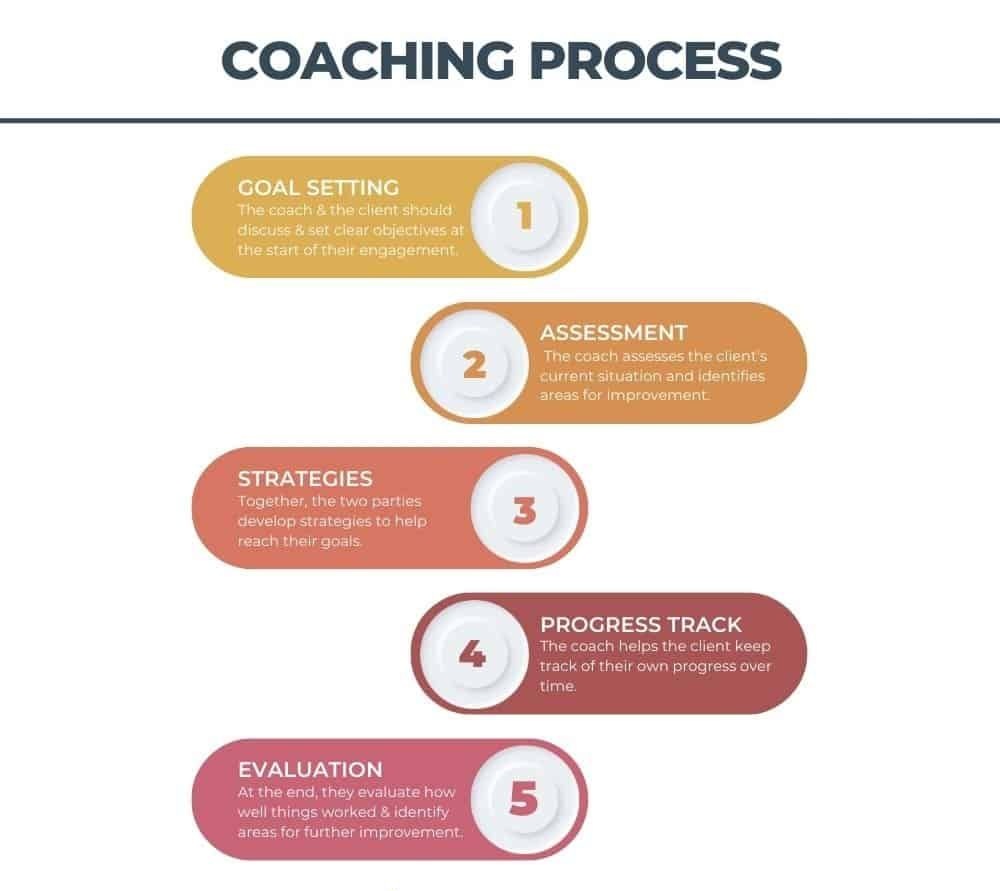Explore the power of coaching – how it helps unlock your potential, facilitate self-discovery, and pave the way for a fulfilling life!
Once in a while, we all experience moments where we know we’re capable of more, but we’re unsure how to bridge the gap between where we are and where we want to be. This is where the transformative power of coaching comes in. More than just advice or mentorship, coaching provides a structured and supportive environment for self-discovery, goal setting, and personal growth.
Highlights
- Coaching is a collaborative process that supports individuals and teams in realizing their potential by fostering self-awareness, goal visualization, and problem-solving skills. It offers a wide array of benefits, including enhanced clarity, boosted confidence, improved decision-making, etc.
- Originating in sports, coaching has evolved into a widespread practice across various life domains, driven by pioneers like Timothy Gallwey and John Whitmore, and is now a rapidly growing industry with diverse specializations.
- While coaching and mentoring both involve guidance, the former focuses on facilitating self-discovery and problem-solving in the present, whereas the latter emphasizes long-term career development through knowledge and advice from an experienced individual.
- The coaching process typically involves five steps: setting clear goals, assessing the current state, mapping out a solution framework, tracking progress, and evaluating outcomes.
- A good coach typically possesses deep understanding and empathy, exceptional listening and communication skills, intuition and insight, adaptability and flexibility, a non-judgmental presence, belief in people’s potential, and the ability to empower and encourage.
- Tips for becoming a successful coach include obtaining certification, embracing continuous learning, developing a structured system, asking empowering questions, and consistently following up with people.
What is Coaching?
Coaching is a type of development activity in which a coach helps improve individual and/ or team performance – by providing support to the person(s) being coached. The International Coaching Federation (ICF) defines it as a collaborative process between two parties that aims to stimulate thinking, and creativity, and inspire coachees to reach their untapped potential.
Main purposes:
- Create conditions that facilitate self-awareness.
- Support the coachee to visualize their desired goal.
- Nurture a spirit of self-control.
- Unlock potentials for enhanced performance in work/life.
- Stimulate problem-solving, decision making and creative thinking.
- Motivate individuals to persist in the desired direction.
- Provide guidance to implementing change.
- Foster a healthy environment for personal growth.
- etc.

Coaching provides an effective way for individuals to reflect on who they are, what matters most in life/work, what their strengths and/ or weaknesses are, as well as problems & solutions needed. A good coach believes everyone has the capability of finding answers on their own, provided that they are equipped with the proper guidance.
Coaching is unlocking a person’s potential to maximize their own performance. It is helping them to learn rather than teaching them.
John Whitmore
Benefits of Coaching
Coaching isn’t just for businesses; it’s a powerful tool for anyone seeking personal growth and transformation. It provides an opportunity to reflect on your current life, develop strategies for improvement, embrace new challenges, and ultimately reach a higher level of self-understanding and fulfillment.
Effective coaching offers a range of benefits, including (but not limited to):
- Increased self-awareness
Coaching allows you to see yourself clearly – including personal strengths, weaknesses, values, beliefs, and the impact of yours thoughts and/or behaviors on life’s experiences. Such knowledge is crucial for making conscious choices aligned with your authentic self and living more intentionally.
- Enhanced clarity & focus
Feeling lost or unsure of which direction to take? Coaching is an amazing tool to clarify your goals, define your vision, and create a roadmap for achieving what you truly desire. In other words, it helps you cut through the noise and identify what’s truly important to you.
- Boosted confidence & motivation
Through coaching, you gain clarity on your aspirations, thereby becoming empowered to step outside your comfort zone, take calculated risks, and pursue your dreams with greater conviction.
Coaching equips you with effective problem-solving techniques and a deeper understanding of your own decision-making processes. As such, you may come up with more informed choices that align with your values and long-term objectives.
- Stronger sense of purpose
Uncovering one’s passions, connecting with one’s values, and discovering one’s unique calling – these are among the various outcomes that you may expect from coaching.
- Greater resilience
Life throws curveballs. That being said, with the help of a supportive coach, you will be better equipped to navigate challenges, manage stress, and bounce back from setbacks with greater strength and wisdom.
- Deeper self-acceptance
Coaching encourages self-compassion and acceptance. It helps you embrace your imperfections, celebrate your strengths, and cultivate a more loving and supportive relationship with yourself.

Those who give and receive coaching are at a great advantage compared to those who don’t.
Jack Canfield & Peter Chee, ‘Coaching for Breakthrough Success’
Origin of Coaching
Originally a term in sports, coaching has, over time, become a popular concept in all areas of life. The principles of coaching were first coined by Timothy Gallwey in his 1974 book “The Inner Game of Tennis”. Later, John Whitmore developed the GROW model and published “Coaching for Performance” in 1992, which then becomes a standard for the industry.
Coaching is one of the fastest-growing industries in recent years, with revenue reaching approximately $52,800 in 2022. According to the ICF, some of the most popular areas include executive/corporate, business, leadership, career/professionals, agility, life-transitioning, and health & wellness.
In the modern workplace, coaches serve as mentors, advisors, and facilitators – often providing ongoing support to develop their client’s skillset and leave a positive lasting impact on business performance.

Coaching vs Mentoring
The terms “coaching” and “mentoring” are often used interchangeably, but there are some key differences between them.
- Coaching involves helping an individual discover their solutions to life’s problems, with the focus being on the individual (coachee). On the other hand, mentoring is a practice of guiding someone towards learning and growth, typically involving a mentor who has experience and expertise.
- The former focuses more on present issues, while the latter looks at future career growth.
- The former is usually a one-time or short-term engagement, while the latter may span over a longer period.
- Coaching often involves goal-setting and acquiring new skills, while mentoring emphasizes knowledge transmission.
- The coach’s role is to help the individual solve their problems on their own, while the mentor is typically expected to provide clear advice and guidance.
- etc.
| Feature | Coaching | Mentoring |
| Focus | Individual’s self-discovery and solutions | Learning and growth through guidance |
| Timeframe | Short-term, one-time or a few sessions | Longer-term, ongoing relationship |
| Perspective | Present issues | Future career growth |
| Emphasis | Goal-setting, skill acquisition | Knowledge transmission, advice, guidance |
| Coach/Mentor Role | Facilitates self-discovery, helps individual find their own solutions | Provides advice, shares expertise, guides development |
Coaching Process: 5 Steps
Set goals
The coach and the coachee should discuss and set clear objectives at the start of their engagement. This ensures that the focus of the whole process will be on what the latter wishes to achieve.
During the initial goal-setting phase, the role of the coach is to facilitate discussions that shed light on the individual’s expectations, needs, and aspirations. Various tools and techniques may be to foster a mutual understanding between the two parties – such as vision boards, decision-making models, and brainstorming exercises.
Assess the current state
At this stage, the coach assesses the coachee’s current situation and identifies areas for improvement. This process involves examining their mental state, daily/ workplace habits, and external conditions that might affect their performance.
To ensure that the coachee is providing an accurate representation of their requirements, coaches need to equip themselves with the necessary skills and tools to extract full information from people. A thorough understanding of the coachee’s specific needs is crucial to lead them down a successful path toward their vision.
Map out a solution framework
Once the goals have been set – and the assessment of the situation has been completed, it is time to come up with an action plan. The coach should work with the coachee to determine what steps they need to take in order to reach their desired outcome.
This includes determining the most appropriate strategies for achieving both short-term and long-term goals and developing a system of accountability that will ensure progress is made and sustained.
Track progress
As the coachee embarks on their journey to success, it is vital to regularly monitor the progress – so that they gain better self-awareness and understanding of how their actions are impacting the outcomes.
The coach plays an irreplaceable role in this phase – they serve as a source of support and guidance, while simultaneously providing frequent assessments for the coachee to stay on track and identify areas for improvement. This collaboration results in a positive feedback loop that encourages healthy progress and pushes the coachee to reach their desired results.
Evaluate outcomes
In the end, both parties evaluate how well their strategies worked and list down areas for further improvement. Goals and objectives may be modified and/ or expanded if necessary.
Read more: Feedforward – 10 Reasons to Try It Over Feedback

Qualities of a Good Coach
In case you’re seeking guidance from a professional coach, certain qualities should be looked out for to ensure a truly transformative experience.
- Deep understanding & empathy
A great coach possesses a genuine desire to understand one’s unique experiences, perspectives, and aspirations. They typically possess the emotional intelligence to connect with you on a deeper level – and create a safe and trusting space where you feel comfortable exploring your inner landscape without judgment.
- Exceptional listening & communication
Another characteristic is the ability to listen deeply, not just to one’s words, but also to the emotions and unspoken messages behind them. Good coaches communicate with clarity, compassion, and honesty, offering insightful reflections and asking powerful questions that enable one to uncover their own truths.
Read more: Not Listening – The Silent Killer in Life
- Intuition & insight
It’s about being able to see beyond the surface and identifying underlying patterns, limiting beliefs, or hidden potential. Great coaches possess the wisdom to offer guidance and support that aligns with your unique needs and helps you unlock your inner wisdom.
- Adaptability and flexibility
The journey of self-discovery is rarely linear. A coach should be adaptable and flexible in their approach, capable of tailoring their methods to others’ specific needs and developmental stages. They understand that everyone’s path is unique and are willing to meet you where you are.
- Non-judgmental presence
They create a safe space for you to explore your vulnerabilities, acknowledge your imperfections, and embrace your authentic self.
- Belief in people’s potential
Perhaps the most important quality is an unwavering belief in individuals’ potential for growth and transformation. They see your strengths, even when you struggle to see them yourself, hold a vision of your highest self, and empower you to step into it with confidence and courage.
- Empowerment and encouragement
A good coach doesn’t tell you what to do or how to be. Instead, they empower you to discover your own answers, make your own choices, and create your own path. They offer encouragement and support along the way, celebrating your successes and helping you navigate challenges with resilience.

Finding the right coach
Types of Coaching Styles
- Solution-focused: This style focuses on finding solutions to present problems – and works best when the person being coached is motivated to make changes.
- Cognitive-behavioral: Here, the focus is on helping individuals identify and challenge negative thinking patterns – so they can take more control over their thoughts, feelings, and behavior.
- Narrative: With a narrative approach, the aim is to uncover stories in a coachee’s life that may be affecting their current situation – enabling them to gain clarity and reframe issues.
- Co-active: Co-active coaching encourages individuals to take responsibility for their own thoughts and actions – so that they may make conscious decisions that lead to positive changes.
- Strengths-based: Coachees are aided in identifying their personal strengths and making the most of their talents.
Read more: Behavioral Styles – 5 Dimensions of Personality

How to Become a Coach: Tips & Best Practices
- Become certified
To become an expert coach, it is recommended that you first earn for yourself a worldwide recognized certification. Qualifications can be obtained through accredited organizations that offer training in the fundamentals of coaching, such as the International Coach Federation (ICF) – or joining programs designed by world-renowed institutions. It is also essential to have a clear understanding of models and techniques applicable to different scenarios.
- Embrace continuous learning
In addition, ongoing development and education is essential in order to stay up-to-date on the latest strategies. Developing a personal approach, building a niche of expertise, and attending conferences and workshops are great ways for coaches to advance their skillset.
- Develop a system
Having a clear framework for the coaching process is essential to stay organized and ensuring that objectives are achieved. It also makes it easier to modify strategies along the way – depending on the progress of the coachee.
- Ask empowering questions
A crucial requirement for coaches is to guide people toward discovering answers and solutions on their own – rather than providing them with direct advice. Open-ended prompts such as “What would make you feel more confident in this situation?” or “What do you think is the best approach here?” foster self-reflection and exploration of new possibilities.
Read more: 200 Self-reflection Questions – Toolkit for Life Pilgrims
- Follow up
It is also crucial for coaches to remain in contact with coachees following a coaching session. Staying connected makes it simpler to track progress and observe how goals are being achieved over time – as well as demonstrates care and concern for the coachee’s development.
In one of the largest studies ever done on the effects of executive coaching – over 70,000 respondents – we learned that the biggest mistake coaches make is in not following up. It didn’t matter who the coach was or what method they used. Failing to follow up made any approach to coaching ineffective.
Dr. Marshall Goldsmith, World #1 Executive Coach & Leadership Thinker

Read more: 11 Best Coaching Books for Transformation & Success
Final Thoughts
Coaching offers a powerful catalyst for one’s personal development journey, providing the tools, support, and accountability needed to break through limiting beliefs, clarify one’s vision, and visualize lasting change. Whether you choose to work with a professional coach or embark on the path of self-coaching, embracing the principles and practices of coaching can empower you to create a life of purpose, fulfillment, and authentic happiness. The power to transform your life lies within you – coaching simply helps you unleash it!
Other resources you might be interested in:
- Coachability: The Secret to Rapid Growth (Plus How to Foster It)
- 10x Thinking: Elevate Your Success to New Heights
- Winning at All Costs: Pitfall on the Path to Success
- Taking Credit for Others’ Work: A Detrimental Habit
- 32 Self Discovery Activities for Everyone
Let’s Tread the Path Together, Shall We?


